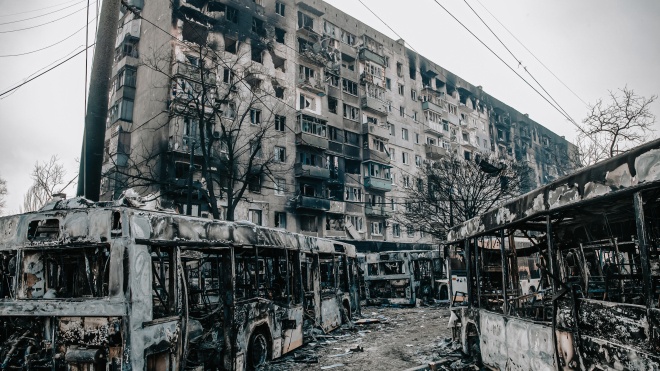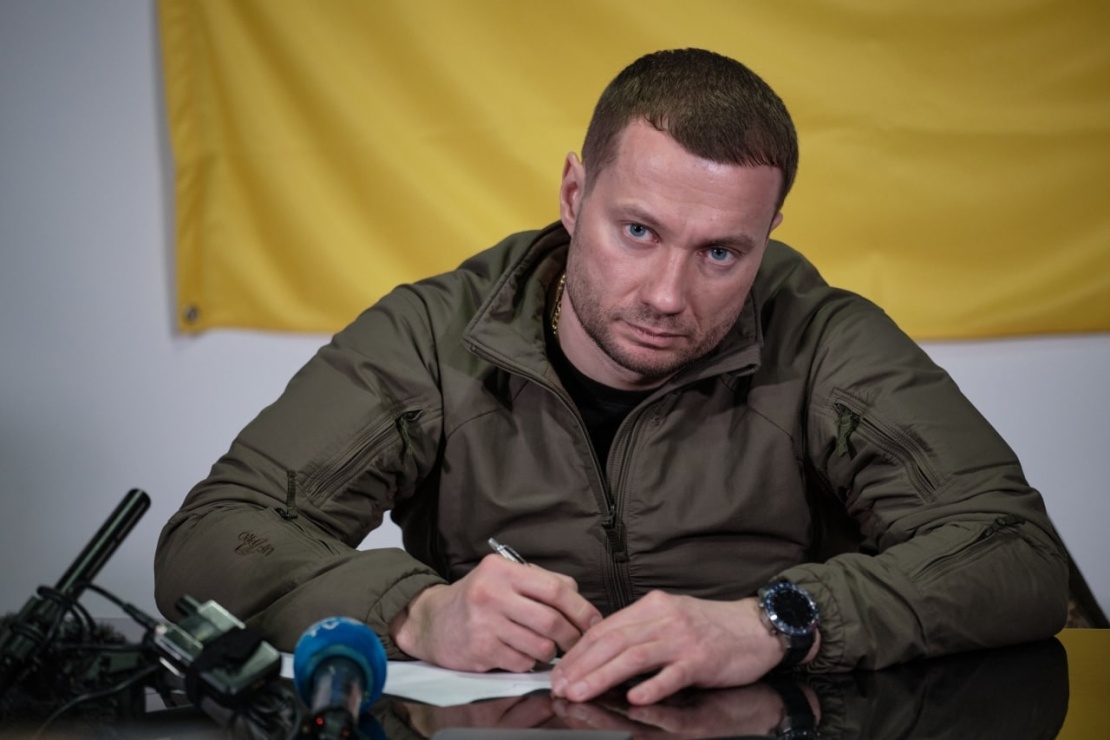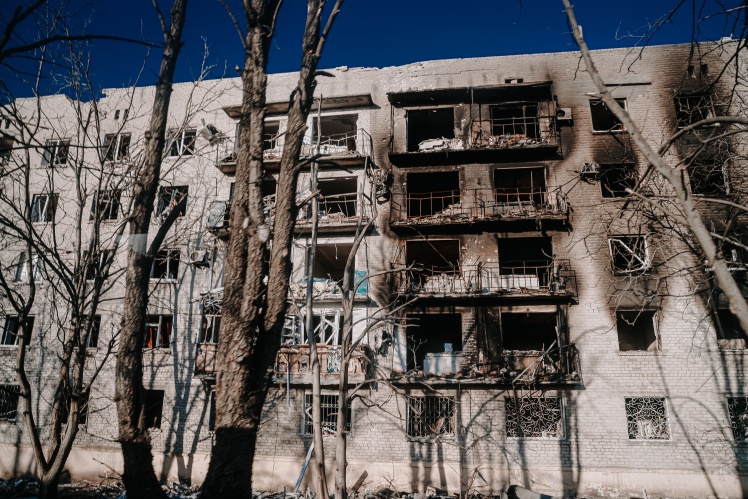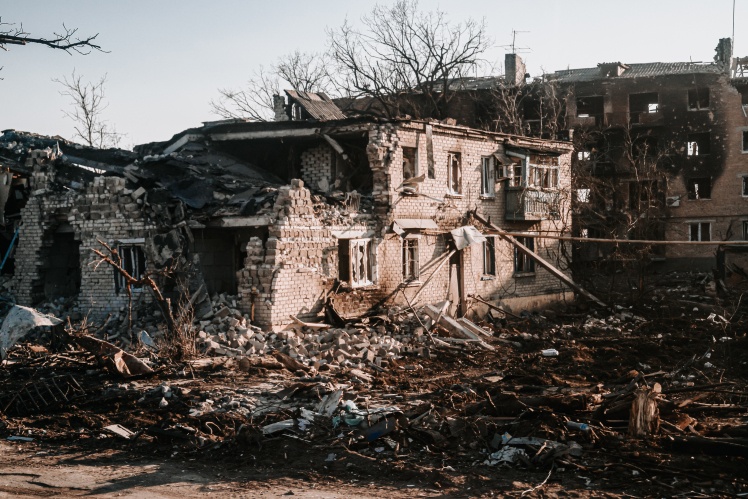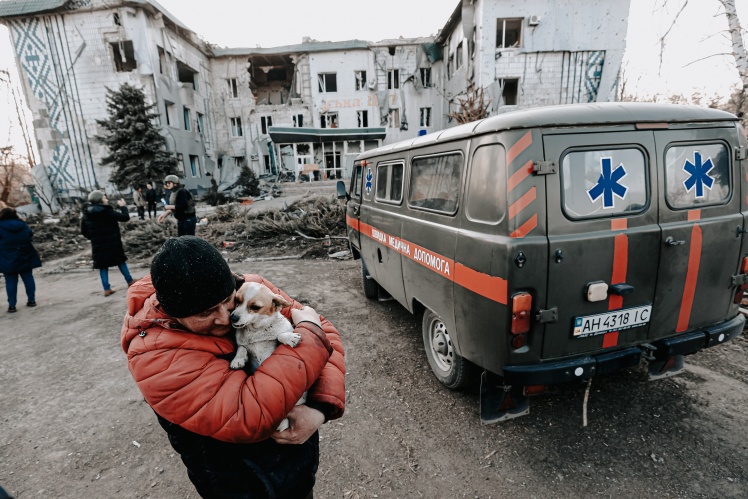― A few days ago, the president set up military administrations in the Donetsk oblast. Isnʼt this because in some areas, the local authorities handed the settlements over to the occupiers?
― The establishment of military administrations is a part of martial law. Of course, we understand that both the political situation and the activities of specific political forces ― more precisely, the [pro-Russian] "Opposition Platform―For Life" (OPFL) political party, were quite dangerous in Donetsk oblast. There were threats that certain parts of the oblast, some cities may behave differently during the war, and there may be quiet sabotage of the preparatory processes, of defense processes. Therefore, Iʼve been working on this issue for a long time to remove the political component from it. In some places, there were signs of sabotage on preparing the cities for defense. So even before Russiaʼs full-scale invasion, we had formed 11 military-civil administrations. I also proposed to establish a military administration in Druzhkivka. This city is one of the OPFL symbols, its former mayor is an MP from this party. He kept control of the town. So when I announced the new head of the military administration, I said that in Druzhkivka, no one would sit quietly and watch the "Wedding in Malynivka"; movie. We are waiting for the enemy only to defeat it.
Donetsk oblast administration head Pavlo Kyrylenko
― Which cities and settlements of Donetsk oblast were occupied after February 24?
Mariupol is blocked but not occupied. The city is under the Ukrainian flag. So-called "Donetsk Peopleʼs Republic" and Russia publish fake videos and try to convince others that itʼs Ukraine who bombed and shelled this peaceful city. Itʼs absurd.
Yes, settlements close to Mariupol are occupied, and continuous fights are there. These are Mangush, Nikolske, and nearby villages.
As of Volnovakha town, itʼs destroyed: 90% of its critical infrastructure doesnʼt exist anymore. So Ukrainian Armed Forces have moved out of Volnovakha and gained hold of other positions. And now, I cannot say that the town is under the control of the Ukrainian government and our army. But as for the settlements of Volnovakha district, the situation is flexible there. In some places, the enemy is repulsed. In other the Russians advance, then everything changes.
Views of a heavily damaged building in Volnovakha city, one of the cities most affected by russians
Getty Images / «Babel'»
On what directions is the situation the hardest now?
Russians are trying to move from the South and the North. Their wish is to encircle the oblast from two sides, to close the way back [for the military]. Some people call this "to make a big Mariupol." They failed with their "three-day blitzkrieg"; and now they want at least to achieve strategic success on the eastern direction. They are trying to reach the border of the Dnipropetrovsk Oblast. The Vuhledar town is continuously shelled, active fights are going on there. The same situation is in the north of the oblast: Russians want to get to the borders of Kharkiv oblast.
The whole territory of Donetsk oblast is now shelled with various missiles: airplane bombs, heavy artillery. Russians use phosphorus bombs are well.
― This is what I wanted to clarify: can you please tell me where they used phosphorus bombs? Is there any information about how many people suffered from them?
- Fortunately, there were no fatalities. Russians use these bombs combined with other types of missiles: "Grad" ones or cluster munitions. Itʼs visible in the night — how phosphorus falls from the sky. Its flames descend slowly, there are videos of this. The temperature of burning phosphorus is 800 degrees Celsius. When it meets oxygen, it burns everything it gets on. There is video evidence of how phosphorus burns on the ground, and how people try to extinguish the fire by throwing soil over it.
They used these bombs, prohibited by international law, in Maryinka, Krasnogorivka, and Avdiivka.
― Whatʼs going on in Mariupol now? Do you know how many people are left there?
― As of this morning, yesterday (on Thursday) we were informed that Russia allowed "the green corridor" for the evacuation of civilians. We have formed convoys with 42 buses. They are full of people and are now ready to move towards [free] Zaporizhzhia city. There was another convoy towards [occupied] Melitopol city with humanitarian aid. All these convoys were agreed upon, Though the Russians can restrict their movement anytime.
There is a big cynicism in what the occupants are doing. First they allow the convoy with humanitarian aid to pass, tell the Ukrainian side about this, but some hours later they confiscate all aid.
Humanitarian caravan of 42 buses from Berdysank and 5 from Melitopol in an evacuation process arrive in Zaporizhzhia, Ukraine on April 1, 2022. About 3500 people were evacuated.
Getty Images / «Babel'»
- Do they give any explanation on this?
- They fool around. "weʼre finding out what happened", "It canʼt be", "no, itʼs not us". We have already gone through this when they took hostage a convoy of buses, drivers and employees of the State Emergency Service. We ask them, what happened, and they say: "No, itʼs the ʼDonetsk Peopleʼs Republicʼ which is responsible, weʼre finding out now," "there was no order" and so on. We see and understand this all. But we must grit our teeth and move on and save people. I hear criticism when people say: nobody saves us there, we are escaping from Mariupol, but thereʼs no help. Indeed, neither humanitarian aid nor bus convoys are getting to or from there. Itʼs not in the occupiersʼ interest. First, they are disappointed that the locals donʼt support them: even when they are morally exhausted and have no food and water, they still refuse to go to the occupied territories [of "DPR"] or to Russia. They want to stay in Ukraine. Therefore, the occupiers are annoyed.
― How do these agreements on green corridors work? Who agrees with whom? You have already said that this is happening with the participation of the International Red Cross. How does this happen?
― There is a headquarters for humanitarian issues, headed by [the Vice Prime Minister] Iryna Vereshchuk. She reports directly to the President, communicates with the military, with the heads of military administrations — the organization of all this, without exaggeration, is a very complicated process. At the state level, they are negotiating with the humanitarian headquarters of the Russian Federation. And they give written confirmations, which never fully worked. They confirm them, and then, when the convoy starts moving, the shellings also start.
When it started on March 5, the situation was extremely cynical. We tried to take the buses that survived out of Mariupol. Initially, there were 50 buses in good condition. But Russians bombed them, 20 burned, only 30 left.
― They were purposefully destroying the buses so that they could not be used?
― Yes, they destroyed the buses. So, on March 5, we agreed on a humanitarian green corridor for the next day. We gave them the route of movement: all the settlements where we move. We provide them with guarantees from the Ukrainian side in Mariupol that there will be a ceasefire. They clearly knew where the heavy artillery of the Armed Forces was, where the armed forces were, they knew their most fortified positions. March 6, there is silence, and then Russians started a tank assault and tried to break into Mariupol from the airport.
Six of their tanks burned, the enemy was defeated, some soldiers were taken prisoners. But all this happened at the time of the agreed humanitarian corridor.
A view of damaged buildings and vehicles after shelling in the Ukrainian city of Mariupol.
Getty Images / «Babel'»
― Earlier you reported that some of the people who fled from Mariupol were in Mangush and Melekine settlements and were dying from starvation there. Is their fate known, were they saved?
― We know whatʼs going on there. There are also people on the coast [of Azov sea] and itʼs very difficult to pick them up. But we are working on this.
― Is there an understanding of how many people are currently in Mariupol?
― I would say that there are no more than 120 thousand people in Mariupol now. 460 thousand permanently lived there until February 24. More than 280,000 people were evacuated in various ways in about 2.5 weeks.
A woman and her dog are seen behind the smashed windscreen of her car after arriving at an evacuation point in a large convoy of cars and buses carrying hundreds of people evacuated from Mariupol and Melitopol on March 25, 2022 in Zaporizhzhia, Ukraine.
Getty Images / «Babel'»
― Is there any understanding of how many people died in Mariupol? It is clear that itʼs unrealistic to count yet, but at least approximately?
- I tried to count this number. At the mayorʼs office I was told that about 100-150 people now die [due to the hostilities] in a day. I say this is not a [decent] statistics. But according to the active and systematic actions (hostilities) that took place, unfortunately, the real numbers are close to this. So right now weʼre talking about more than 5,000 people who died because of the shellings. Unfortunately, this figure can be much higher. There are corpses on the streets, itʼs impossible to take them away. You saw these photos.
Mariupol. Bodies of dead civilians lie in a bombed out neighborhood, possibly killed by tank shrapnel seen laying on the street.
Getty Images / «Babel'»
― You stated that the Russians were forcibly deporting Ukrainian citizens to the occupied territories or to Russia. Do you have approximate information about who was taken out, maybe you make lists of such people? And what is the approximate number of people forcibly deported by the Russians?
- Yes, we form such a list. For example, there is a girl from Mariupol whose father was killed, she was forcibly taken to Donetsk, but her grandfather is trying to bring her back. We are dealing with this issue very closely, we have involved international organizations, and use all possible means of influence to return her.
In total, the Russians have already deported about 30,000 Ukrainians. But the enemy is faced with the fact that our people do not want to leave Ukraine. I have information, which I canʼt say is 100% verified, but two sources confirmed it to me that a leader of the so-called "DPR" was going to visit one of the schools in Donetsk, where hungry people were forcibly brought. But our people allegedly wrote "Glory to Ukraine" on the wall. So his visit was cancelled. Even in such extremely difficult conditions people are not afraid to show their attitude, they speak.
― What advice would you give to people who have been deported, for example, to Donetsk or to Russia?
― Itʼs needed to use all possible means to get out of Russia.
Russia doesnʼt just deport or export people to the "L/DPR" territory. If they take them to Russia, they do it for some reason: either they need votes, or to make a vision of pseudo-referendums, or simply for propaganda purposes. They are shooting directed interviews with such people. They use concentration camps in the Mangush community, where they separate men, women and children and then select who can suit them.
- And after that?
― They really do check tattoos on the bodies of men and women to make sure there are no "signs of nationalism." They are also interested in those who are registered in the Donetsk oblast. And then they confiscate Ukrainian IDs and give the certificate for deportation to the territory of the Russian Federation.
― What would you advise these people?
- They must demand to be left in Ukraine. Or else, if there is no threat to their lives, after the possible deportation to the territory of the "DPR" they can try to leave from there through Rostov oblast and further to Ukraine. But if people are deported directly to the Russian Federation, it is large and, according to the information available, Ukrainians are deported to very remote regions.
― The Russians have already abducted 13 local mayors in Ukraine, including Vasyl Mitko from Nikolsk, Donetsk oblast. Do you know his fate?
― Itʼs quite an interesting situation. He was detained but released later. This was about three weeks ago when the fighting for Mariupol continued. After that, I had a conversation with him. I knew that after he was released he had the opportunity to leave.
I contacted him, told him what he can do [to get out of the occupied territory]. "You will be in a safe place, and we will continue working," I told him. Why do I allow myself to say this? Because when someone tries to say that [he canʼt] leave his home, that he grew up here and so on… I was also born and raised in the Donetsk oblast. On March 14, 2014, I escaped the occupied Crimea, where I also have a lot left. And then in June 2014, I left the [occupied] Makiyivka. Thatʼs why I know what itʼs like to leave everything behind. But the homeland is still one. These are not patriotic slogans. I went through this all. I proved it to him, said that there was an opportunity to go out, and showed how to do it. But no one is moving anywhere at the moment.
The situation in the Mangush is similar. There, the head of the Mangush territorial community, [Volodymyr] Karaberov resigned, while his first deputy and community government, according to what we see and understand (and our intelligence is working well), have sided with the occupier.
Is there any criminal case opened?
Yes. The law enforcement agencies investigate everything. And when they say that they have been abducted, I cannot put these people in this category. I clearly told them what to do first [when thereʼs occupation], what to do second: ensure the safety of the team, work with them, mobilize all their efforts, collect the necessary documents, seals, stamps and get to the designated place [ for the evacuation]. I explained all this to them. But they never showed up. So their status is definitely not abducted. Now they are in the shadows. But they are not ordinary locals, they have a position, they perform the functions of local government, are part of the state mechanism — and they should not help the occupants with their actions.
It is possible and necessary to give oneʼs life for oneʼs homeland, but this should be when there are no other options. A living professional will benefit the country much more. The best soldier is a living soldier. Therefore, the first task is to save your life and not cling to your locality and cooperate with the enemy for its sake. I donʼt accept that. I have the right to say this, because I went through it.
― Many observers say that the Russians have been defeated in the Kyiv direction, so they will try to reach the administrative borders of Donetsk and Luhansk oblasts. Is the region ready for the Russians to step up their attacks?
- There are risks. We are constantly getting ready. At the beginning of the interview I said how they move. We do many things to strengthen, train and assist the military. Our actions are coordinated, we are preparing. Escalation, exacerbation is the most likely development.
― You offered people from the settlements near where hostilities are taking place to leave. Did they listen?
― I offered and do offer now. The citizens are listening. About 120,000 were taken out of the region, not including Mariupol. But unfortunately, we see that people become active too late: when a nearby street or a house is on fire. And then it greatly complicates the situation for us, because we are distracted from the direct struggle with the enemy.
It is not interesting for the enemy to surround a city where there are no civilians. Why is this happening in Mariupol, why did they not let any humanitarian aid into the city? The answer is simple: they want to be feared. Constant bombardment is, too, the way to sow panic.
― Is the oblast provided with products? Is it possible to pay pensions and ensure the livelihood of the region?
- Yes, we do all this. Food, humanitarian aid — the algorithm is set up. We understand who receives humanitarian aid kits, and whether people have the opportunity to buy food. Now, in addition to Mariupol, there are cities in a difficult situation along the demarcation line, but they are not surrounded, not occupied, there is the Ukrainian government, which provides everything.
With the management of the Pension Fund we worked through the algorithm for pension provision, it is coordinated and worked out.
― Do you have direct contact with the president, do you need it?
― I can communicate if itʼs necessary. But I understand subordination very well. The presidentʼs power is structured in such a way that if I ask him questions directly, he will ask exactly why Kyrylenko is asking him about it and who didnʼt do his or her work. Of course, when we discuss humanitarian corridors, Deputy Head of the Office Kyrylo Tymoshenko calls, we communicate, as well as with Iryna Vereshchuk, Andriy Yermak (Head of the Presidentʼs Office). He can turn on the speakerphone, and then I report to the president. I never abused this possibility. I perform my functions, I know what to do, we must all be in our place.
A young girl cries before the train leaves the eastern city of Kramatorsk, in the Donbas region on April 3, 2022.
Getty Images / «Babel'»
